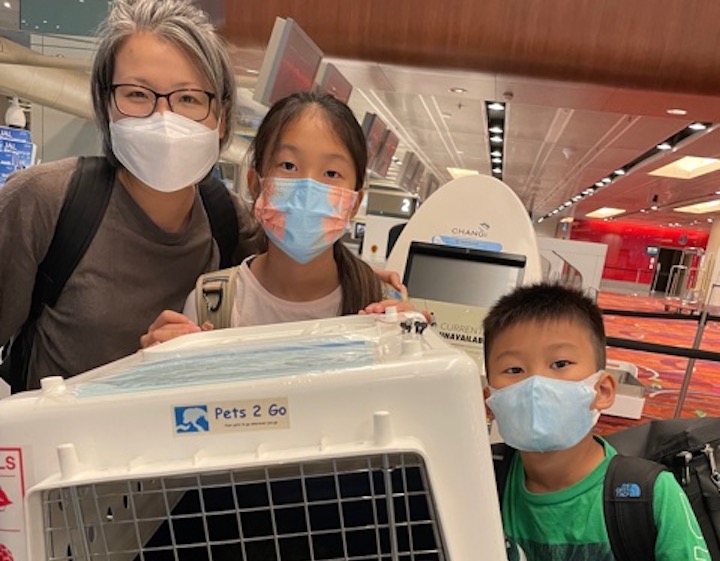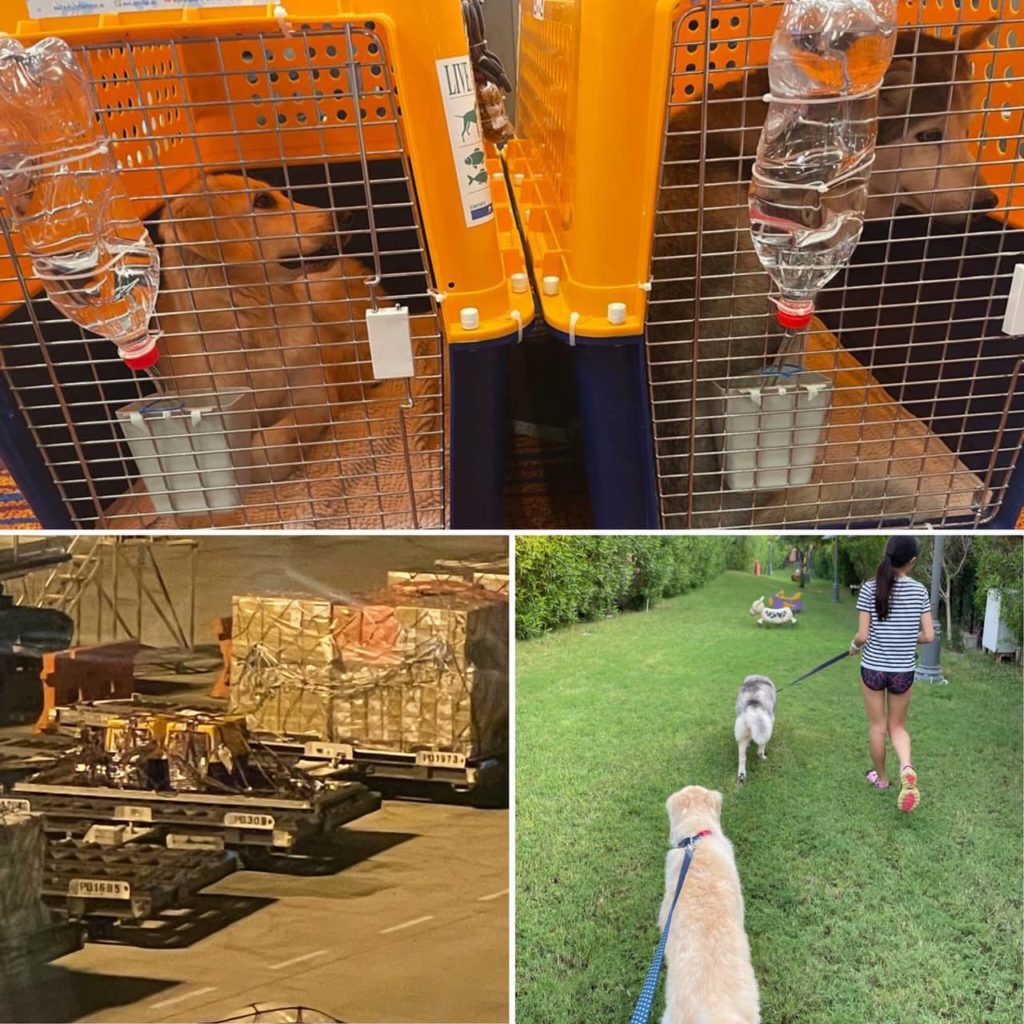

Wondering how to relocate your pets? Singaporean Sharon Sim, mum to two kids and many furkids, shares her pet relocation story plus don’t miss our pet relocation checklist!
Sharon Sim shares how her family used a pet relocation service in Singapore to move her cat and two senior dogs across the world during the Covid-19 pandemic. Her number one tip? Relocating pets is a long process so getting an early headstart is so important!
Singaporean Sharon Sim moved to Doha Qatar with her family in 2021:
When my husband was assigned a work role in Doha, Qatar, the country – like many others during the pandemic – was not open to visitors. Only my husband who had a work permit could enter the country and apply for a family visa for us to enter. Prior to the move, we had to find out how many pets we could move because different countries had different regulations on the number of pets allowed. Other considerations are the type and breed of animals, age of pets as well as vaccination requirements and validity of dog’s licence in Singapore.


We were only allowed to bring in some of our pets
Qatar only allowed one pet to be brought in per resident ID. My husband had moved to Qatar earlier in February and had obtained his resident ID shortly after arrival. We had six pets then and managed to find lovely homes for three of them – the Pacific parrotlet and a pair of terrapins. We chose to bring our cat, 14-year-old Siberian Husky and 12-year-old Golden Retriever with us to Qatar.
Initially, we had planned for me to pack up the house and the kids and I would fly over, then apply for a resident ID for each family member so that we could bring in our three pets together; at least they would have each other as travel companions. My husband returned to Singapore in April to help with the move. As Qatar had allowed fully vaccinated residents to return home without quarantine and pets were not required to be quarantined, my husband brought the cat home as excess baggage while the kids and I had to be quarantined in a hotel facility.
To simplify the process and minimise the hassle of paperwork and figuring out the regulations, we engaged a pet relocation specialist in Singapore to help us with the move. We started the process in December 2020 with the required vaccination and microchipped our cat. Having the pets vaccinated against rabies was the first step for us and the entire process takes a minimum of 4 months (about 120 days). At least 30 days after the rabies vaccination, the pets would require a blood sampling (rabies serology test). Only when they pass the test, they can travel after 90 days from the date of the test. One week prior to the flight, pets must undergo a health check-up (fit to fly) and also have their documents approved by authorities for importing them.
Once overseas, please ensure rabies annual vaccination are kept up to date (not even 1 day late) otherwise one would need to restart the process all over again and it might affect getting the pets relocated home or somewhere else in a timely manner.


The pandemic caused havoc with our pet relocation
Upon arrival in Doha and after we obtained our resident ID, we asked our pet relocation company to help find a flight out for the dogs. We faced a couple of challenges such as high cargo fees charged by airlines, fluid flight routes, cancelled flights and changes in animal import regulations between countries that resulted in a delay. Eventually, we realised that importing the dogs as cargo was not working out in our favour, so I flew back to Singapore so that I could bring the dogs over as excess baggage. Since I am a fully vaccinated resident of Qatar, I would not need to be quarantined and would be able to take the dogs directly home upon arrival in Qatar.
We got crates at least a month prior to travel because we wanted the pets to get accustomed to the crate. We placed their favourite towels/rugs into the crate so that they would be familiar with the crate and occasionally encouraged them to walk into the crate and gave them lots of praise when they did that.
We had to wait for about five months before the pets were eligible to travel because of the pandemic, and our dogs had to wait a further four months before they joined us.
Relocation Costs
Pricing wise, it depends on the pets weight, destination and classification of travel. If carrying as excess baggage, check with the airlines the maximum weight allowed – some airlines would publish the rates. Our two dogs weighed about 40kg in total and I did not pay more than $800 in total. However, if we were to transport them as cargo, some airlines were charging us between $16k-30k per pet regardless of weight of the animal (fixed pivot weight).
I am sure in pre-COVID-19 days, it would have been more straightforward for the pets to join us as we could perhaps find a flight buddy for the dogs to travel as excess baggage, have more flight options, cheaper cargo fares and fewer restrictions between countries in terms of importing live animals. We were fortunate that our pet relocation team at Pets 2 Go was so relentless in researching flight options with their counterparts in Malaysia, Dubai and Qatar, preparing and submitting the necessary paperwork, and sending the pets to the clinic for their health check. They sent my pets to the airport close to midnight and queued with me for more than an hour at check-in to ensure the dogs were taken over by the airport staff before they left. They have been so patient and kind to our pets and responsive to our queries.
We are thankful for their help and are happy to be finally reunited with our dogs!
Pet relocation checklist
Here is a guide of what you’ll need when you are thinking of relocating your pet from Singapore. It’s important to check the destination country’s import requirements as laws of different countries are very diverse. These import requirements can be found on the website of the destination country’s relevant government authority. However, there are some basic things that you need to check or get ready:
Approve breed/age: Check if your airline will approve your breed and age of pet.
Number of pets allowed: Check how many animals your destination country will allow.
Pet Vaccination Card: Certifying all routine vaccinations have been done (check if rabies vaccination is required for your destination country).
Original Microchip Certificate: or have the number indicated in a vaccination record if the certificate is not available.
Original sterilisation certificate: (or gender status indicated in vaccination record if the certificate is not available.
Original Rabies blood test report from AVS. (Be warned the entire rabies vaccination process takes a minimum of 4 months (about 120 days). At least 30 days after the rabies vaccination, the pets would require a blood sampling (rabies serology test). Only when they pass the test, they can travel after 90 days from the date of the test.)
Medical history of pet (if any current health condition that requires medication to be administered on a daily basis)
Owner’s passport copy (same as the licensee in Dog license)
Contact details: Complete residential address and contact number in the new country.
Pet Health Certificate: You’ll need an original certificate, issued by a private or government veterinarian, stating that “the pet is healthy and free from any contagious or infectious disease at the time of examination”. The date of examination must not be more than 7 days from the date of export from Singapore. You may also need to provide your destination country with proof that the pet has been microchipped and dewormed. Some countries might require additional treatments against particular parasites or your pet may be required to go into quarantine. Talk to your vet to get a plan in place months in advance.
Dog Licence: You will need a valid and current Singapore dog licence (not applicable to cats). Your dog license must be presented to the Animal and Veterinary Service, NParks Singapore prior to the issuance of an export permit.
Export Permit: Get an Export License issued by the Animal and Veterinary Service, NParks Singapore via GoBusiness Licensing Portal within 30 days of leaving Singapore. As the export licence is only valid for 30 days, remember to apply for it at the right time. A step-by-step guide on how to apply for this export licence can be found here.
Pre-export inspection: Make an appointment for your pet’s inspection by submitting a request via the Intelligent Food Approval & Safety Tracking System (iFAST) 5 days before departure.
Crates: Get the correct crate size for the pets.
If taking pets along as excess baggage: call airlines to check if that particular flight is suitable and has space to accommodate the crate and let them know to expect the pet. Get an email confirmation so that it is easier at the check in counter for the staff to refer to.
For more information on what you need to do before relocating your pets check the NParks website.

Pet relocation services in Singapore
Looking for a reliable pet relocation service in Singapore to help your furbabies? Here are a few you can consult for quotes, quarantine requirements, necessary vaccinations and much more:
- Pets 2 Go
- Pet Movers
- Shiloh PetMove Singapore
- Jason’s Pet Relocation
- Ricted Kennels
- Anvis Pet Relocation
Swipe for more interesting reads!






 View All
View All





 View All
View All








 View All
View All







